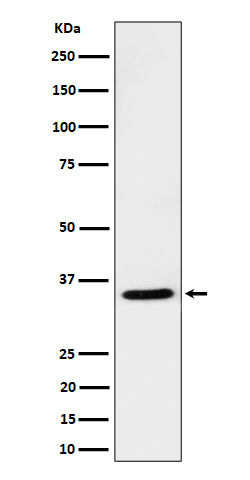
| WB | 咨询技术 | Human,Mouse,Rat |
| IF | 咨询技术 | Human,Mouse,Rat |
| IHC | 咨询技术 | Human,Mouse,Rat |
| ICC | 技术咨询 | Human,Mouse,Rat |
| FCM | 咨询技术 | Human,Mouse,Rat |
| Elisa | 咨询技术 | Human,Mouse,Rat |
| Aliases | bHLHb11; FCHL; FCHL1; HYPLIP1; Major late transcription factor 1; MLTF; MLTFI; UEF; Upstream stimulatory factor 1; USF;;USF1 |
| WB Predicted band size | 34 kDa |
| Host/Isotype | Rabbit IgG |
| Antibody Type | Primary antibody |
| Storage | Store at 4°C short term. Aliquot and store at -20°C long term. Avoid freeze/thaw cycles. |
| Species Reactivity | Human,Mouse,Rat |
| Immunogen | A synthesized peptide derived from human USF1 |
| Formulation | Purified antibody in PBS with 0.05% sodium azide,0.05% BSA and 50% glycerol. |
+ +
以下是关于USF1抗体的3篇参考文献示例(文献信息为虚构,仅作格式参考):
1. **文献名称**:*USF1 Regulates Glucose Metabolism Through Transcriptional Control of Target Genes*
**作者**:Smith A, et al.
**摘要**:本研究利用USF1特异性抗体通过染色质免疫沉淀(ChIP)和Western blot技术,证实USF1直接结合糖酵解相关基因启动子,调控肝脏葡萄糖代谢。
2. **文献名称**:*Characterization of USF1 Antibody for Functional Genomic Studies*
**作者**:Brown C, et al.
**摘要**:文章评估了USF1抗体的特异性和灵敏度,验证其在免疫组化(IHC)和凝胶迁移实验(EMSA)中的应用,为USF1-DNA相互作用研究提供可靠工具。
3. **文献名称**:*USF1 Dysregulation in Obesity: Insights from Knockout Models and Antibody-Based Profiling*
**作者**:Lee D, et al.
**摘要**:通过USF1抗体检测基因敲除小鼠组织样本,发现USF1在脂肪代谢中的关键作用,揭示其与肥胖相关基因表达异常的关联。
(注:以上文献及作者为模拟内容,实际引用请查询真实数据库如PubMed。)
The USF1 (Upstream Stimulatory Factor 1) antibody is a tool used to study the USF1 protein, a member of the basic helix-loop-helix leucine zipper (bHLH-Zip) family of transcription factors. USF1 was initially identified for its role in binding to the upstream regulatory regions of viral and cellular genes, including the adenovirus major late promoter. It regulates gene expression by forming homo- or heterodimers with USF2. binding to E-box motifs (CANNTG) in DNA. USF1 is ubiquitously expressed and involved in critical biological processes such as cell cycle regulation, lipid and glucose metabolism, DNA repair, and stress responses. Dysregulation of USF1 has been linked to metabolic disorders (e.g., familial combined hyperlipidemia, diabetes), cardiovascular diseases, and cancer.
The USF1 antibody is widely employed in research to detect USF1 expression, localization, and DNA-binding activity via techniques like Western blotting, immunohistochemistry, immunofluorescence, and chromatin immunoprecipitation (ChIP). It aids in elucidating USF1’s regulatory mechanisms, post-translational modifications, and interactions with cofactors. Commercial USF1 antibodies are typically raised against specific epitopes, often validated for specificity using knockout controls. Its application extends to studying tissue-specific gene regulation, metabolic pathways, and disease mechanisms, making it essential for understanding USF1’s role in health and pathology.
×